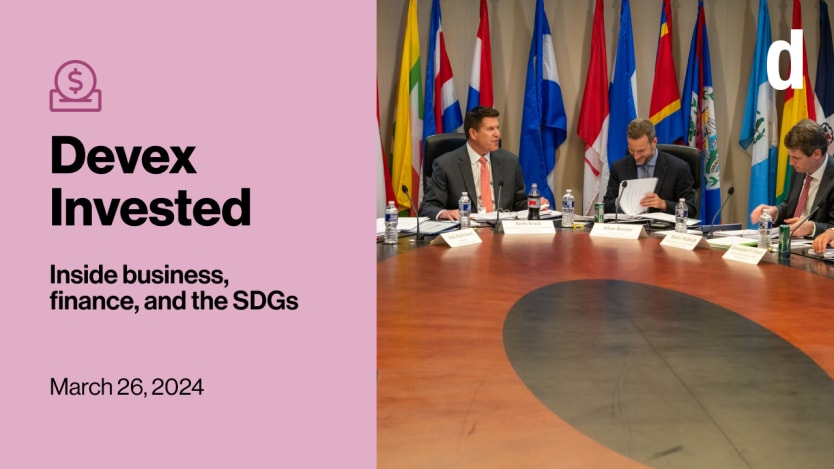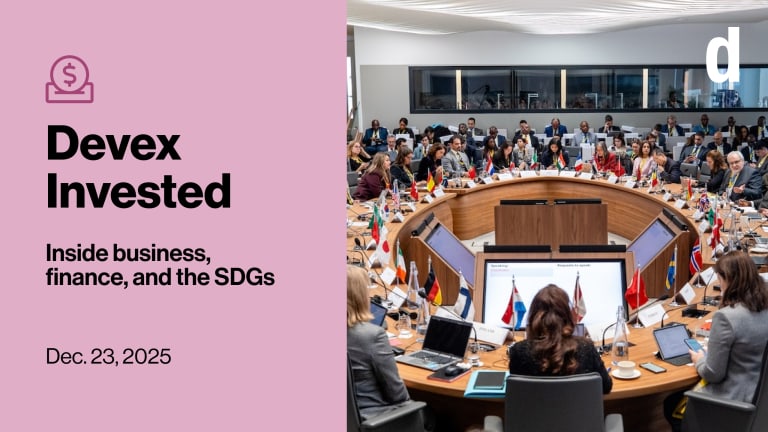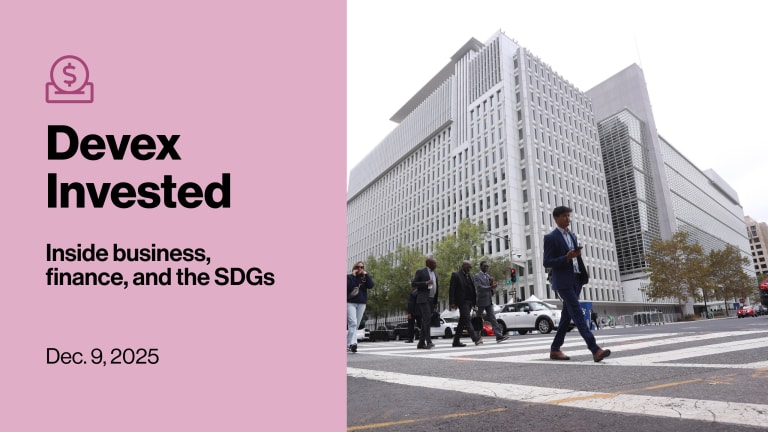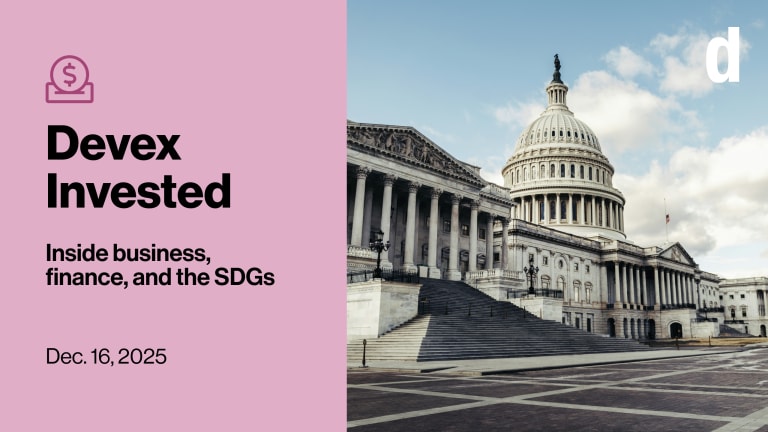Presented by The Mastercard Center for Inclusive Growth

A few weeks ago, we brought you a missive from a concerned former staffer on what the U.S. International Development Finance Corporation, or DFC, can’t do. This week, we’ve got seven things DFC could change in order to make more impactful investments.
This is a preview of Devex Invested
Sign up to this weekly newsletter inside business, finance, and the SDGs, in your inbox every Tuesday.
In an opinion piece for Devex, Mark Kennedy and Jeffrey Kucik of the Wilson Center propose:
• A modified board structure that favors experience in finance in low- and middle-income countries.
• More competitive compensation, in accordance with the industry standards from which it recruits.
• A single environmental review, accepted by all U.S. government entities.
• Funding a revolving account, to which returns on equity investments would flow back to the agency to fund future projects and credit subsidy costs.
• Expanding the list of nations eligible for investment to be better aligned with World Bank Group standards.
Opinion: 7 ways the US DFC can make its investment more impactful
Related op-ed: How the US DFC is stuck in a carnival game
And speaking of DFC …
It has opened its first office in Latin America. CEO Scott Nathan was in São Paulo, Brazil, this month to open the office in the U.S. Consulate. The new office will “help to expand our portfolio of investments in this critical economy,” he said in a statement.
Chantarella DeBlois, the new regional managing director in Brazil, will lead the office, which is part of a broader DFC plan to open more local offices and boost its investments in Latin America. DFC has plans to open an office in the Dominican Republic as well.
What types of investments might DFC make in a place like Brazil? So far it has announced a nearly $470 million loan to StoneCo Ltd., a financial technology company, aimed at increasing short-term working capital to help businesses grow. It will focus on businesses led by women or in low-income communities in the country.
Background reading: What’s behind DFC’s new strategy — will it help or hinder growth? (Pro)
+ Join us on April 4 for a Devex Pro event — a conversation with DFC Deputy CEO Nisha Biswal to get her insights on where development finance is headed and what it could mean for global development as a whole. Save your spot now and get your questions ready.
Miliband to billions
The European Humanitarian Forum in Brussels just held its third edition and, as we told you back in 2022, the European Union’s top aid official, Janez Lenarčič, wants to use the event partly to get private money flowing into the gap between humanitarian needs and public aid budgets.
Devex’s Rob Merrick was on the ground and reported on some of the real talk at a session on incentivizing private investment.
David Miliband, head of the International Rescue Committee, was eager to promote humanitarian debt swaps, an initiative he said IRC is excited to be pursuing with the EU.
“Countries are often loaded with a lot of debt that is trading at a very low value, and the interest rate has a big risk premium on it,” Miliband said. “This is a vicious circle, and the idea of a humanitarian debt swap is to restructure that debt with a political guarantee from a country or from one of the international financial institutions. You then dedicate a proportion of the savings towards a humanitarian goal.”
Read: IRC boss decries 'vortex' of EU's nexus of finance and aid (Pro)
Spring sale!
The months ahead will bring many critical moments for global development, including the World Bank Spring Meetings and World Health Assembly. Head into it armed with crucial insider insights from the experts and institutions that will shape what happens with a Devex Pro membership. Until March 28, we’re offering a rare discount — $200 off an annual membership — to get you ready for spring. Not yet a Pro member? Sign up now to get the discount!
You'll get access to:
• All our news and analyses.
• Data on how the biggest donors are allocating their funds.
• Exclusive conversations with experts and monthly leader roundtables.
• The world’s largest global development job board and resources to help advance your career.
• The Weekender newsletter, read by development leaders every week for insights into what’s happening inside the sector’s biggest institutions.
• Networking opportunities at Devex summits.
Green card conundrum
Your next job?
Finance Analyst/Senior Finance Analyst
International Monetary Fund
United States
It looks like a rule change made last year by the U.S. State Department in how it processes and provides green cards is making waves at the World Bank.
“What seemed at first glance to be a minor bureaucratic adjustment in fact turned out to be a dramatic policy shift that threatens the Bank’s reputation, effectiveness, and value proposition if left unchecked,” the bank’s staff association wrote in a recent update to employees.
Often, World Bank employees qualify for green cards during or following employment — a perk for some non-American staff. But the rule change will make it difficult or perhaps impossible for retirees of international organizations and their families to stay in the U.S., according to the staff association document.
A recent staff survey found that 91% of the 2,447 respondents wanted a green card after retirement and that 81% of them will have met the residency requirements. Most of them also do not have a potential sponsor and many of them have dependents, some of whom have lived much of their lives in the U.S.
We’ll keep an eye on this issue and any ripple effects.
Indigenous impact
Vince was at the Asia Pacific Impact Investment Summit in Sydney, Australia, last week. It was a chance for the Australian government to get the word out about its new AU$250 million (about $164 million) Australian Development Investments initiative, which aims to provide concessional investment to impact investment funds that then give early-stage finance to businesses in the Indo-Pacific.
There was also a strong focus on indigenous Australians.
Clinton Schultz, director of Sobah, an Australian aboriginal- and family-run company making nonalcoholic craft beers, says one challenge for aboriginal and Torres Strait Islander businesses in impact investing is the definition of impact itself.
“For the last few years now, it's been very difficult in the impact investment space, unless you're talking about green and green tech, to actually get your foot in the door,” Schultz said during the event. “So when we're talking about things like cultural connectedness as being at the forefront of importance to us as First Nations peoples — because we know it's one of the greatest determinants to strengthen socioemotional well-being and therefore better opportunities and futures for generations to come — it's very hard for us to explain that and to quantify that, in terms of impact.”
“I think we need to have a shift in terms of how impact is actually considered and how it is therefore going to be measured and assessed,” Schultz continued, “if we really want to make a difference to different marginalized groups, particularly aboriginal and Torres Strait Islander peoples here in Australia.”
What we’re reading
For locally led adaptation to scale, top-down approaches will not work. [Devex]
The European Bank for Reconstruction and Development and the Bank of Palestine support small businesses in the West Bank. [EBRD]
An overview of the final text of the EU Corporate Sustainability Due Diligence Directive. [Human Level Briefing Note]
Who were the Bill & Melinda Gates Foundation’s top nonhealth grant awardees in 2023? We’ve got the list. [Devex Pro]









